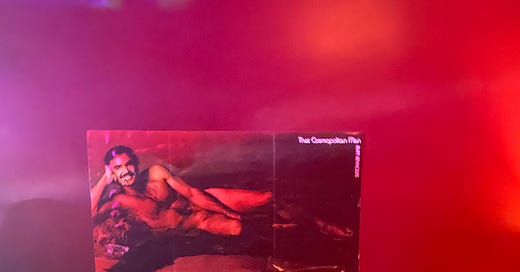On Saturday night I found myself standing by a high-top table at a bar frequented by twenty-something-year-olds, sipping, uncharacteristically for me, a cranberry soda. The feel of the place can be described as “drag-queen retro” since it is dipped in burgundy and sparkle, and decorated with mid-century furniture, a disco ball, and a waterbed by the entrance. The kids that frequent it wear imaginative outfits scavenged in 70s thrift stores. There seems to be a general understanding that if you step into this space you consent to “good vibes only.” A small platform in the corner serves as a stage for one, and the young patrons who climb on it in rotation, for brief, Tiktok-like performances, are unfailingly met with cheers. There was unusual excitement when that Robyn song came on about the girlfriend. In that moment, I realized, no one in there other than me was acutely aware of their lower back hurting.
I was not at this bar out of novelty or mistake. My friend had been there before and she thought it a good place for dancing, which it was. I never really “went dancing,” not intentionally, even when I was younger. Dancing, when it happened, was something typically ignited in me by circumstance, alcohol, and ABBA. But in recent years I have appreciated dancing as the best resistance–against anything–and to refuse the occasional chance at it feels like a sin. The conditions at this bar were optimal for it, what with the purplish green reflections and the euphoric partygoers. It was what you would call “a scene.” The trouble was, I was not in it.
Let me be clear: the kids were alright. There was absolutely nothing wrong with them–almost to a fault. They were beautiful, they were joyous, and they were free. None of the prejudices and insecurities of my own generation when I was their age–expressed in black eyeliner and Marlboro Lights–seemed to plague them. As Aldous Huxley said, from where I stood with my bad back, they appeared to be treading life lightly, comfortable in who they were, which was, on the whole, uncategorizable. Nobody was too drunk and the music was not too loud. Conversation could be had next to dance moves. They were congenial and polite to each other. If this was a snapshot of the future, then the world was going to be fine, and my grievances were as irrelevant as my middle-aged ailments—both symptoms of someone who carries on their spine the weight of a lot of past. And I was the past. I had had my time, and now they were having theirs. I could dance if I wanted to but it was far better to watch them do it.
If this is coming across as a bittersweet post, worry not, there is a picture of a naked Burt Reynolds at the end of it. I would not at all mind time passing, if it did not happen so unnoticeably, turning fools out of us when such flashes of recognition catch us by surprise. We cannot catch Time but we can at least trap those. We can bottle them up, turn them into words. Turn them into something.
Animals
Have you forgotten what we were like then
when we were still first rate
and the day came fat with an apple in its mouth
it’s no use worrying about Time
but we did have a few tricks up our sleeves
and turned some sharp corners
the whole pasture looked like our meal
we didn’t need speedometers
we could manage cocktails out of ice and water
I wouldn’t want to be faster
or greener than now if you were with me O you
were the best of all my days
— Frank O’Hara
[1950]





I am not quite so old
To feel this old.
And I am not quite so young
To think this young.
But every so often
If I squint just the right way
I can see that
I can still make paperclips.
That poem is a heart punch wow!